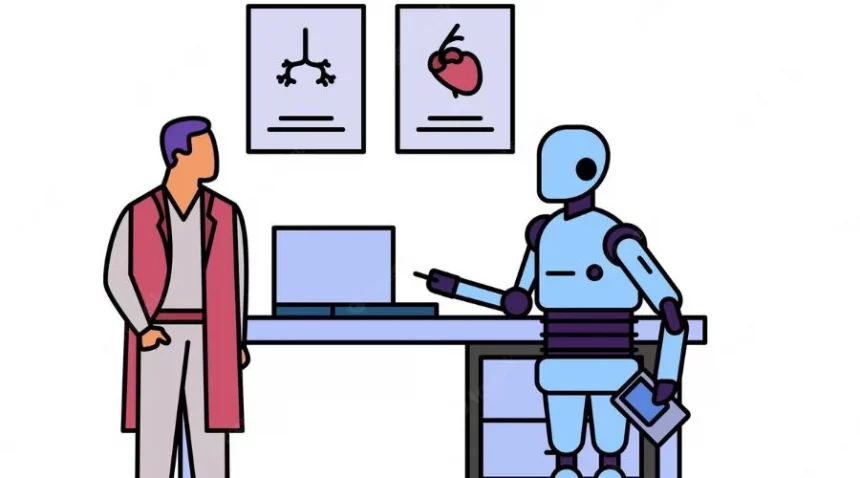The healthcare industry has undergone a massive transformation in recent years, thanks to the rapid advancements in technology. From telemedicine to wearable devices, technology is making it possible for patients to receive high-quality care from the comfort of their homes. This has led to a more patient-centered approach to healthcare, with providers focusing on delivering personalized care that meets the unique needs of each patient. In this article, we’ll take a closer look at how technology is shaping the future of healthcare and what it means for patients, healthcare providers, and the industry as a whole.
Technological Advancements in Healthcare
The healthcare industry has always been at the forefront of technological advancements, with new innovations constantly being developed to improve patient care. One of the most significant technological advancements in recent years has been the development of telemedicine. Telemedicine allows patients to connect with healthcare providers remotely, using video conferencing technology. This has made it possible for patients to receive medical care from the comfort of their homes, without having to travel to a healthcare facility.
Another significant technological advancement in healthcare has been the development of wearable devices. Wearable devices, such as smartwatches and fitness trackers, can monitor a patient’s vital signs and provide real-time feedback on their health. This has made it possible for patients to monitor their health outside of a healthcare facility, giving them greater control over their healthcare.
Benefits of Technology in Patient Care
The benefits of technology in patient care are numerous. Telemedicine, for example, has made it possible for patients to receive medical care from anywhere, at any time. This is particularly beneficial for patients who live in rural areas, where access to healthcare can be limited. Telemedicine has also made it possible for patients to receive medical care without having to leave their homes, which can be particularly beneficial for patients who have mobility issues.
Wearable devices have also had a significant impact on patient care. These devices can monitor a patient’s vital signs and provide real-time feedback on their health. This has made it possible for patients to monitor their health outside of a healthcare facility, giving them greater control over their healthcare. Wearable devices can also alert healthcare providers if a patient’s health is deteriorating, allowing for early intervention and preventing the need for hospitalization.
Telemedicine and Virtual Healthcare
Telemedicine has been one of the most significant technological advancements in healthcare in recent years. Telemedicine allows patients to connect with healthcare providers remotely, using video conferencing technology. This has made it possible for patients to receive medical care from the comfort of their homes, without having to travel to a healthcare facility. Telemedicine has also made it possible for patients to receive medical care from healthcare providers in other parts of the country or even in other countries.
Virtual healthcare, which includes telemedicine, has become increasingly popular in recent years, particularly during the COVID-19 pandemic. Virtual healthcare allows patients to receive medical care without leaving their homes, reducing the risk of exposure to infectious diseases. Virtual healthcare has also made it possible for healthcare providers to continue providing medical care during times of crisis, such as natural disasters or pandemics.
Wearable Technology and Health Monitoring
Wearable technology has had a significant impact on patient care in recent years. Wearable devices, such as smartwatches and fitness trackers, can monitor a patient’s vital signs and provide real-time feedback on their health. This has made it possible for patients to monitor their health outside of a healthcare facility, giving them greater control over their healthcare.
Wearable devices can also alert healthcare providers if a patient’s health is deteriorating, allowing for early intervention and preventing the need for hospitalization. This can be particularly beneficial for patients with chronic conditions, such as diabetes or heart disease, who require frequent monitoring of their health.
Electronic Health Records (EHRs) and Patient Data Management
Electronic health records (EHRs) have become increasingly popular in recent years, as healthcare providers seek to improve patient care and streamline their operations. EHRs allow healthcare providers to access patient records quickly and easily, reducing the risk of errors and improving patient outcomes.
EHRs also allow for better patient data management, allowing healthcare providers to track patient progress over time and identify trends in patient health. This can be particularly beneficial for patients with chronic conditions, as healthcare providers can monitor their progress and adjust their treatment plans accordingly.
Artificial Intelligence and Machine Learning in Healthcare
Artificial intelligence (AI) and machine learning have become increasingly popular in healthcare in recent years, as healthcare providers seek to improve patient care and streamline their operations. AI and machine learning can be used to analyze patient data and identify patterns in patient health, allowing healthcare providers to deliver more personalized care.
AI and machine learning can also be used to develop predictive models, allowing healthcare providers to identify patients who are at risk of developing chronic conditions or other health problems. This can be particularly beneficial for patients with complex health needs, as healthcare providers can intervene early and prevent the need for hospitalization.
Robotics and Automation in Healthcare
Robotics and automation have become increasingly popular in healthcare in recent years, as healthcare providers seek to improve patient care and streamline their operations. Robots can be used to perform repetitive tasks, such as medication dispensing or patient monitoring, freeing up healthcare providers to focus on more complex tasks.
Robots can also be used to assist with surgical procedures, reducing the risk of complications and improving patient outcomes. Robotic surgery has become increasingly popular in recent years, particularly for procedures that require a high degree of precision.
Challenges and Concerns with Technology in Healthcare
While technology has had a significant impact on patient care in recent years, there are also challenges and concerns associated with its use. One of the biggest concerns with technology in healthcare is the risk of data breaches and cyber-attacks. Healthcare providers must take steps to ensure that patient data is protected and secure.
There are also concerns about the impact of technology on the healthcare workforce. As robots and automation become more prevalent in healthcare, there is a risk that healthcare providers may be replaced by machines. This could have a significant impact on the healthcare industry, particularly for healthcare providers who are already facing staffing shortages.
The Future of Healthcare with Technology
The future of healthcare with technology is exciting, with new innovations being developed every day. The use of artificial intelligence, machine learning, and robotics is expected to become more prevalent in healthcare in the coming years, allowing for more personalized care and improved patient outcomes.
Telemedicine and virtual healthcare are also expected to become more prevalent in the coming years, particularly as patients seek to receive medical care from the comfort of their homes. Wearable technology is also expected to become more advanced, allowing for more comprehensive health monitoring and improved patient outcomes.
결론
The future of healthcare is bright, thanks to the rapid advancements in technology. From telemedicine to wearable devices, technology is making it possible for patients to receive high-quality care from the comfort of their homes. While there are challenges and concerns associated with the use of technology in healthcare, the benefits are numerous. As we continue to develop new innovations, the healthcare industry will be able to deliver more personalized, patient-centered care that meets the unique needs of each patient.



